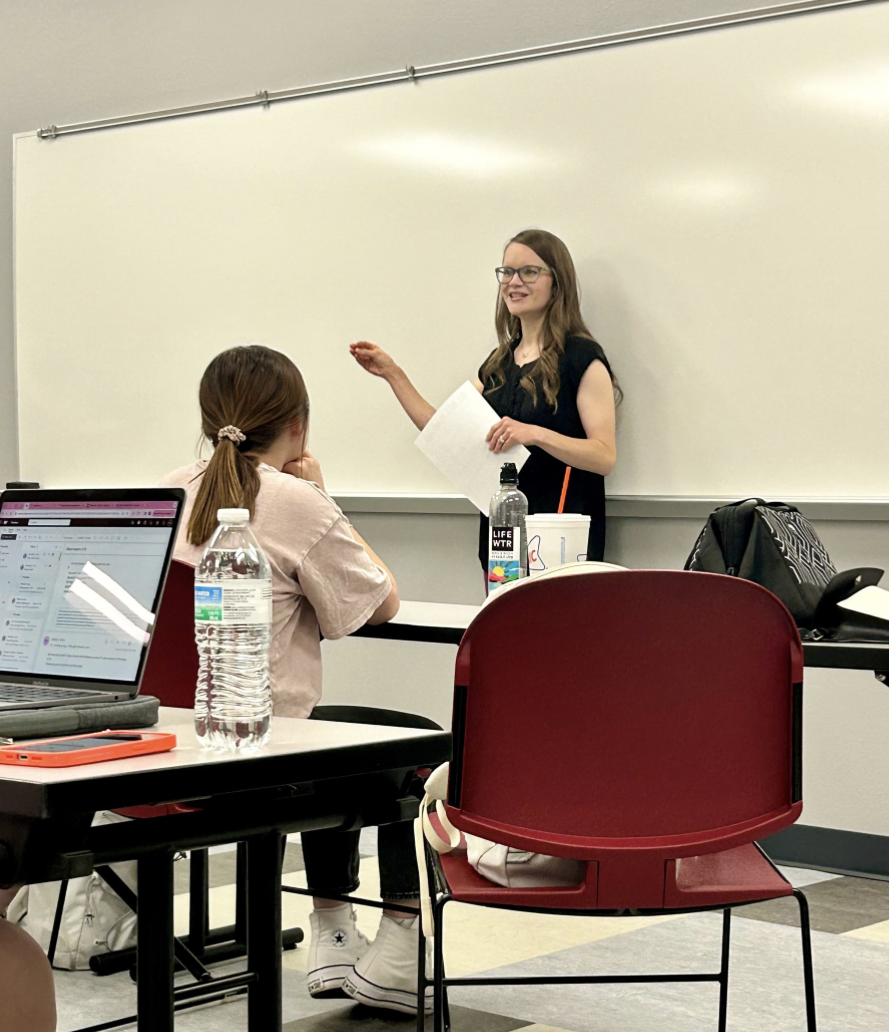Professors Purpose: Empowering Students to Live Their True Identity
By: Kiley Duggan and Jaclyn Ferrel
he classroom begins to fill with students. Within minutes the seats are filled and attention is turned to the front as two bright and smiling professors stand before the class. The semester has worn on and stress is high, but all of this seems forgotten as the pair of professors speak to their students as friends.
Professors Landon and Morgan Brown first met in graduate school at West Texas A&M University. Landon recalls his first impression of Morgan, “She was the smartest person in the room.” Now married for just over six years, with two young daughters, and working together, the Browns are model professors with a passion for their field of Communication Disorders and most importantly, their students.
By sharing the same core beliefs and standards, the Browns complement each other in their individual skills and work styles.“I’m a big-picture, visionary dreamer and she is a very detail-oriented person,” Landon said. “It’s a lot of fun teaming up with her on stuff. I’m constantly dreaming and telling her, ‘Can you figure out how to make it work?’ And she does a great job of doing that.” Morgan reflects that developing ideas, discussing hard things, and working alongside Landon is a gift.
The professors have structured their classes and teaching principles around a “person-centered approach.” During their education and experience in therapy, Landon and Morgan identified this student-centered method that seeks to understand their pupils beyond their role as a student. “You're a person, which means that you have dreams, you have hopes, you have doubts, you have fears, and all of the gambits of human qualities,” Landon said. “We want to get to know those.” As crucial as it is to understand roles as professionals, the Browns also seek to emphasize the importance of their students understanding their deeper, truer identity.
In review of recent student evaluations, measured from House Bill 2504, the Browns are some of the highest-rated professors at West Texas A&M. The pair began teaching within the same department around 4 years ago. Through the course of their professing partnership, the pair has created a classroom and departmental culture promoting a person-centered approach and increased student wellness.
Morgan describes her role as a professor as an opportunity to equip, teach, and learn alongside students in the classroom. “I entered into a career in education to be able to play a small role in helping equip and prepare students to serve and increase the quality of life of all the patients they will serve,” Morgan said. “I stay in education because I have realized the gift and privilege it is to serve students not only as students but as people,” Morgan explains that she is constantly inspired by her students and the persistence, resilience, and joy they continue to bring into the classroom despite the many hardships of life.
Utilizing the “person-centered approach” often leads to deep classroom conversations that go beyond the course material. Landon identified these conversations as his favorite part of the job, finding purpose and fulfillment in helping students discover themselves. Landon challenges his students to critically think about who they want to become, the character they want to have, and who they want to be remembered as. Landon explains the importance of the method further, “If we're clear on who we want to be, we can take steps every day and become a little bit more like that person.”
The Browns strive to encourage critical thinking within their classrooms. Landon goes on to describe how he encourages his students to question everything he teaches, acknowledging the fact that each individual student understands things differently. “It's always amazing to me how one student may be on the same page as me while another student may be approaching it from a totally different angle that I've never considered.”
To Landon and Morgan, learning never stops, even for professors. “I used to feel like I needed to know everything, have an answer to every question,” Morgan said. “Now I realize that is an impossible task; we should all be learning continually. I am very comfortable now, admitting that I do not know an answer, but that I will find the answer.



